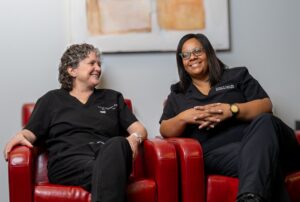For diabetics: if you take diabetic medication by mouth, do not take these the morning of your surgery
For the surgery:
- Once you check in, the nurse will bring you to the operating room. The anesthesiologist will give you medicine to help you relax and sleep. Once asleep, the anesthesiologist will gently place a tube in your throat to help you breathe during the procedure. You will not feel any pain.
Just after the surgery, in the recovery room:
- You will awake in the recovery room and be cared for by a recovery nurse, who will monitor you closely. Medications will be given as needed for pain and nausea. Once you are stable, you’ll be transferred to a hospital room; if you’re in a surgery center, you will remain in the same post-operative room.
Staying and recovering in the hospital:
- Medication will be given to treat your pain and nausea as needed
- Once fully awake, you’ll start slowly drinking liquids
- You’ll be encouraged to get up and walk around once you’re able to, and without experiencing any abdominal discomfort
- We’ll do deep breathing exercises with your intentive spirometer, which keeps your body well-oxygenated
Discharge criteria for leaving the hospital:
- Pain can be controlled with medications, given by mouth
- Ability to tolerate liquids – at least 1 ounce every 15 minutes for at least 2 hours
- Able to move around independently
- Vital signs are normal (heart rate, blood pressure, breathing rate and temperature)
Following this, you’ll be scheduled for a follow-up visit three weeks from discharge. Call our office to schedule this if you don’t have an appointment.
Preparing the Skin Before Surgery
Preparing or “prepping” the skin before surgery can reduce the risk of infection at the site of surgery. One step our center takes is choosing disposable cloths moistened with a rinse-free, 2% Chlorhexidine Gluconate (CHG) antiseptic solution. The steps below outline the prepping process and should be followed carefully before your surgery:
Prep the skin at both of the following times:
- Night before surgery (after your shower, if you’re taking one at this time)
- Morning of surgery (again, after a shower, if you’re taking one at this time)
Directions:
- Shower or bathe at least one hour before prepping the skin for the first time (not any sooner)
- Once you begin applying, your skin should be completely dry and cool. If you have sensitive skin, CHG may cause skin irritation, such as temporary itching and/or redness; showering or shaving immediately before applying may enhance these effects.
- Prep the abdominal area. Avoid contact with eyes, ears and mouth. Use one cloth in the evening and the other in the morning before surgery.
- Allow the area to dry for one minute. Do not rinse. It is normal for the skin to have a temporary “tacky” feel for several minutes after the antiseptic solution is applied.
- CHG works best when left on the skin; do not rinse it off once applied. If you do need to shower after applying, make sure the water is not hot (warm is okay).
Other notes:
- Once you’ve started prepping with the 2% CHG cloth, do not shower, bathe or apply lotions, moisturizers or makeup. Reason being, water and ingredients commonly found in personal care products can reduce the antiseptic effects of CHG.
- Shaving should be suspended 2 days before surgery on ALL areas of the body (including face, legs, underarms)
- If itching or redness persists, rinse the affected areas and discontinue use
Medicine to take/NOT to take on day of surgery
There is a long and comprehensive list of medicines which are permissible and forbidden on the day of your surgery.
You can read this list here.
If you have any questions, please contact our team immediately.
Following surgery, you’ll be put on a strict diet regiment. This is made to incorporate your dietary changes. You can read more about that in our Post-Surgery section.


